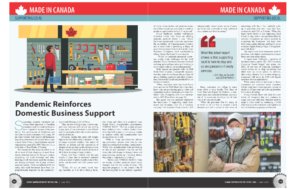The pandemic has reportedly increased interest in domestic companies
According to an article in the June issue of Home Improvement Retailer magazine, the health crisis has changed the way consumers and businesses look at Canadian companies. With the permission of the publisher, we are reproducing the article in full.

Pandemic Reinforces Domestic Business Support
Supporting domestic businesses has always been important to Canadian consumers and this trend has become more important because of the pandemic. The ramifications of lockdowns and lost sales concerns consumers, with many (86 per cent) worried their local small businesses may close permanently in the near future, says a report from Ownr, a small business support organization operated by RBC Ventures Inc., a subsidiary of Royal Bank of Canada.
For consumers that make an effort to do all or most of their shopping at small businesses, their top reasons for doing so include supporting the local economy and jobs, knowing small businesses need the revenue, and having preference for buying products made in Canada. “They are influenced by the reality that small businesses have been disproportionately impacted by the pandemic,” says Shadi McIsaac, CEO of Ownr.
They are also willing to pay more to support local business, with 44 per cent willing to pay up to 10 per cent more at a local business f r an identical item also sold at another, non-local retailer.
However, despite this, price still weighs high in factors influencing consumers to opt for large corporate retailers. The option of delivery or pickup and the expectation of cheaper prices are among the top reasons that 45 per cent of Canadians plan to do most or all of their shopping at large retailers.
Prices have been volatile over the past couple of years due to increased transport costs as a result of global supply-chain bottlenecks, and increases have been passed on to buyers.
“Today, it’s not as much about buying Canadian as it is about buying inventory when and where it is available,” says Randy Martin, vice-president, procurement, TIMBER MART. “The last couple of years have definitely been a sellers’ market; however, that will change in the coming months as markets soften and manufacturers have excess inventory to sell.
“With so many manufacturers allocating production, dealers were wise to continue supporting their existing manufacturers. While most manufacturers were not looking to take on new customers over the last two years, this will change as demand slows and manufacturing catches up – which is already beginning to happen in our industry.”
Martin says TIMBER MART’s focus on buying Canadian products hasn’t really changed over the last couple of years. “We negotiate programs for our dealers with all the best suppliers in our industry regardless of origin. Some dealers sell products manufactured in Canada and some sell or distribute products manufactured in the U.S. or abroad.”
Home Hardware, another well-known Canadian brand, does focus on offering domestic products where it can. “Home Hardware understands customers appreciate the availability of Canadian-made products and is committed to providing a lineup of goods that are manufactured in Canada,” says Marianne Thompson, chief merchandising officer, Home Hardware Stores Limited.
“While the pandemic presented numerous supply chain challenges for the retail industry, Home Hardware remained focused on being agile and innovative and working in coordination with all our supplier-partners.”
Both banners are partners with the Well Made Here program, a non-profit organization that seeks to encourage the purchase of quality building materials and other products manufactured in Canada and produced for the residential market.
“When customers visit their local Home store and see the Well Made Here logo, they know they are purchasing quality items and supporting local entrepreneurs and manufacturers,” says Thompson. (For more information on Well Made Here, see page 16)
She agrees that the pandemic reinforced the importance of supporting small businesses and shopping local. As a Canadian company, “we are proud of our close to 1,100 independently owned stores across Canada and what they contribute to their individual communities and local economy.”
Many consumers are willing to make every effort to shop locally. The ‘State of Local Business Report,’ by Podium, a communication and payments platform, says nine out of 10 consumers would go out of their way to do business locally.
“When the pandemic first hit, many of us went out of our way to support a local business and had to adjust to new ways of interacting with them from curbside pick-up to payments over text,” says Eric Rea, co-founder and CEO at Podium. “What this latest report shows is that supporting local is here to stay and so are pandemic-friendly services. Consumers are deeply invested in supporting the businesses that keep their local communities thriving and they’ve come to expect digital-friendly ways of doing business with them.”
The report says local businesses need to prioritize their digital transformation to meet these customer expectations.
A report from PayBright, a provider of instalment plans, agrees. The ‘2022 Canadian Consumer Trends Report’ says going into 2022, 25 per cent of Canadian consumers would choose not to shop somewhere that didn’t have an online option. In addition, after a long absence from in-store shopping, consumers will return in 2022 with higher customer service expectations.
When asked what is important to them, consumers say increased safety measures (64 per cent) and diverse payment options at checkout (55 per cent) are their top priorities for in-store shopping.
Going forward, there will likely be more waves of disruption that will continue to shape customer behaviour. Retailers need to adapt to these trends by continuing to build relationships with customers and suppliers as well as their buying groups and banners.
Click here to view the 16-page “Well Made Here” feature section in the same edition of Home Improvement Retailing Magazine.
